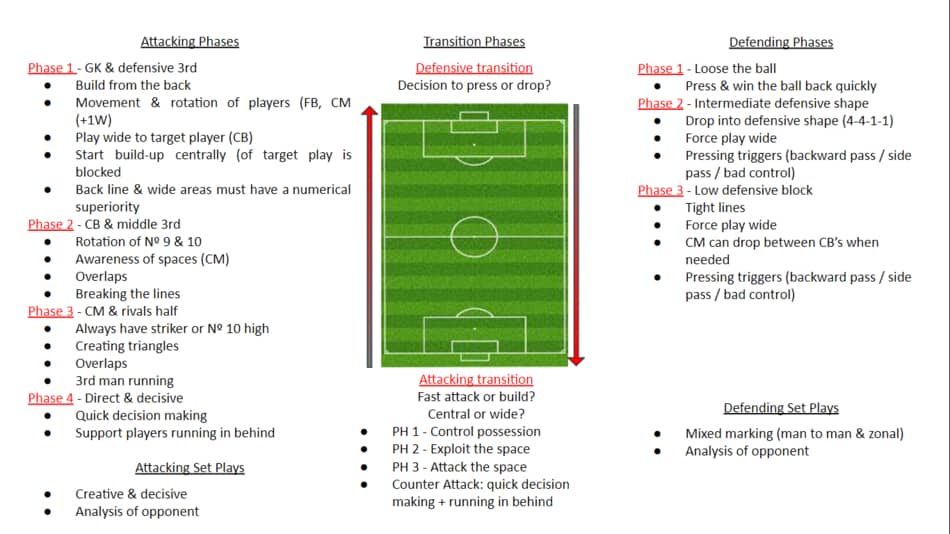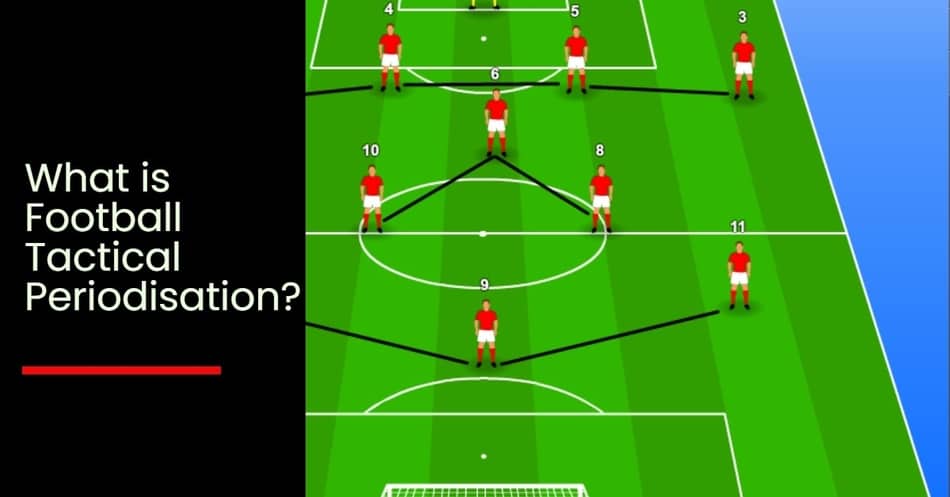I am sure that you have heard managers/coaches, in interviews, speak about their philosophy. However, a lot of the time it is used in such a vague way that it is hard to define what a coaching philosophy is.

After over a decade of coaching teams of various ages and levels, I have studied the meaning of a coaching philosophy for my own personal professionalism and now I want to help new coaches understand what a coaching philosophy is.
A football coaching philosophy is a set of beliefs and principles that guide your coaching decisions and therefore dictate how you want to coach a team. Without a clear philosophy, it can be difficult to make decisions, especially when things get tough.
In this blog post, I am going to explain the following topics on a coaching philosophy:
- Why do you need a coaching philosophy?
- What should your football coaching philosophy include?
- How to develop your coaching philosophy
- Putting your coaching philosophy into practice
- How can you make sure your players buy into your philosophy?
- Sample football (soccer) coaching philosophies
- What happens if you change your mind about your coaching philosophy later on down the line?”
So let’s get started!
Why do you need a coaching philosophy?
A football coach needs a coaching philosophy for a few reasons.
Firstly, it allows you to stay true to your beliefs and principles, even when things get tough.
Secondly, it gives you a blueprint to make decisions. This is important, especially during the season when things are constantly changing and you have to make split-second decisions.
Finally, having a coaching philosophy helps you to develop as a coach. It will provide a framework in which you will continually improve your craft through professional development and experience.
What should your football coaching philosophy include?
Your coaching philosophy should include everything!
I hear you, that is being vague… but stay with me.
Your philosophy is going to help you to deal with every issue that you come across, whether it is a tactical decision, dealing with players’ behavior to dealing with parents/agents.
Below are examples of what needs to be included in a coach’s philosophy:
- Identification of what is important
- Your beliefs and principles
- The type of player you want to develop
- Your coaching style
- The values you want to promote
- Your coaching goals
- The type of players you want to coach
- Recruitment strategy
- The type of team you want to coach
- The principles by which you will coach your team
- How you will achieve your goals
- How to deal with parents/agents
- How you will develop your coaching skills
- Playing philosophy
Identification of what is important
One of the first steps to developing your coaching philosophy is to identify what is important to you.
“You must have a firm foundation from which everything grows”
Dan Iverson
This can be anything from the development of your players to aiming to win the league.
The level at which the team plays might have a large influence on what is important to you.
For example, A premier League coach, due to the huge demands, might regard winning as the most important output; an under 12’s local coach might consider player development or fun and social happiness as their main goal.
Your beliefs and principles
Your beliefs and principles are the foundation of your coaching philosophy. They should be non-negotiable and guide all of your coaching decisions.
For example, one of my beliefs with the U12 8-A-Side team is that all the players (excluding the goalkeeper) should play in at least 2 different positions.
Your coaching style
The style of coaching is an important aspect of your coaching philosophy. Certain coaches are renowned for adopting a particular style.
This does not mean that you always have to administer just one style all the time. A coach may use a variety of coaching styles for each specific situation.
But it is important to have a clear idea of which style you will adopt in advance so that you are consistent throughout the whole season.
The type of player you want to develop

Many academy coaches will know the type of players that they want to produce, for example, an Ajax player that has grown up through their academy is more likely to be tactically intelligent and possess good technical skills as this is part of the club’s football DNA.
This also makes it easier for young players to transition into the first team, as they have the necessary skills that fit the team’s identity, and it means that the club has a clear pathway from youth development to the first team.
The values you want to promote
Your values are an important part of your coaching philosophy as they will shape the culture of your team.
Some values that you might include in a coaching philosophy are:
- Respect
- Hard work
- Determination
- Teamwork
- Fun
Your coaching goals
Your coaching goal should indicate what you want to achieve during your coaching journey.
This should include short-term goals, as well as mid to long-term goals. Now, these goals might change over time, but that is perfectly fine and you can just adapt or change these as and when they might evolve.
The type of players you want to coach
This will apply mainly to coaches at a higher level where they are deciding on which players they want to buy and bring into the club.
Coaches at lower levels may not have the luxury of options and must coach who they have.
So in the same way that a coach will have a vision of how they want their team to play, a coach should also have an idea of the type of player they want to coach.
This can include:
- Current playing attributes of a player
- Player personality and character
Current playing attributes of a player – do you want to work with a player that has a certain amount of
- Technical ability
- Speed
- Tactical awareness
- Defensive abilities
- Dribbling ability
- Passing ability
These important attributes that you might want from a player will depend on the position that you see the individual playing in. For example, whilst you might want your attacking players to have good dribbling skills; for a defender, this may not be as important.
Player personality and character – The reason I include personality and character is due to all the successful coaches building a team (squad of players) that worked well with each other but also worked well with themselves (the coach).
If you sign players that possess personalities that are not going to be compatible with your own, and his/her character is to be disruptive then this is more than likely not going to help the coach succeed.
So a team, that has stockpiled a host of star players may find that this does not automatically equal success.
Just take a look at PSG over the years.
A coach must select players that are compatible with their coaching philosophy and playing philosophy.
This can be demonstrated when looking at Jose Mourinho’s relationships with players. Frank Lampard and Ashley Cole worked well with Jose Mourinho and speak about him in glowing terms.
On the flip side, Luke Shaw did not have the same personality as Lampard and Cole and therefore didn’t respond in the same positive manner, to Mourinho’s methods, as Lampard and Cole.
Note: I appreciate that grassroots coaches may not have the privilege of being able to pick and choose players.
Recruitment strategy
The recruitment strategy is how you plan on acquiring the players that you want to coach.
It is important to have a recruitment strategy as it will ensure that you are able to get the right type of player for your team.
A recruitment strategy is needed at both a professional club and a local amateur football club.
A few things that you might want to consider when developing a recruitment strategy are:
- Position
- The age of the player
- The ability of the player
- The level of the team that you are coaching
- Where you will find these players
- How you will attract these players to your team
The type of club you want to coach
As well as having a particular style of play that you want your team to adopt, you should also have an idea of the type of club you want to coach for.
This will include the culture of the club and whether the values that you want to promote fit within a particular club.
The principles by which you will coach your team
These principles are the foundation of your coaching philosophy and will shape everything that you do as a coach.
Some examples of principles that you might want to include in your coaching philosophy are:
- Giving young players an opportunity
- Developing players
- Playing attractive football
How you will achieve your goals
A major part of your coaching philosophy is how you plan on achieving your goals.
It includes the methods and strategies that you will use to help you achieve success.
Some things that you might want to consider when thinking about how you will achieve your goals are:
- The type of training methodology that you will implement with your team
- Psychological strategies to use
- What tactical strategy is to be adopted
How to deal with parents/agents
For those who coach kids, dealing with parents can be a large part of your responsibilities; whereas coaches who are involved at a more senior and professional level may have to deal with football agents.
Make sure that parents or agents understand your philosophy from day one so that they know what to expect.
This can be done by having a meeting in which you present your coaching philosophy and allows parents/agents to ask any questions that they may have.
How you will develop your coaching skills
As a coach, you should always be looking to improve and develop your skills.
Your coaching philosophy should include how you plan on doing this.
Some things that you might want to consider are:
- Attending coaching courses or workshops
- Reading books/articles on coaching
- Listening to podcasts
- Watching videos on coaching
- Observing other coaches
- Talking to other coaches
Click here to read: 7 Tips to Improve your Football Coaching Skills
Playing Philosophy
The playing philosophy is how you want your team to play football.
It includes the style of play, formation, and tactical approach that you want your team to adopt.
Some things that you might want to consider when thinking about the way you want your team to play are:
- How do you want your team to attack
- How do you want your team to defend
- How to transition from attacking-to-defending
- How to transition from defending-to-attacking
- Set-pieces

Whilst you need to also consider the formation that you want your team to adopt, this may not necessarily alter the above playing style of the team.
If you would like to know about playing philosophy then click here.
How to develop your coaching philosophy
Now that you know what a coaching philosophy is and what it should include, it’s time to start developing your own.
A coaching philosophy is a personal thing and should be unique to you. It should be a living document that is constantly evolving and is regularly being referred back to; not forgotten about on a shelf.
To develop your coaching philosophy you must write it down!
This sounds obvious but, how many coaches write down their coaching philosophy?
If it is not written down in some form or another then you will end up making things up as you go along. Whether that is with how you deal with disciplinary issues, parents/agents, or other members of staff.
All the answers to various scenarios of your coaching journey will be found in your coaching philosophy and if it is not, then you can figure out how to deal with a new scenario and then add the experience, along with the solution, to your coaching philosophy document.
So write down notes on all the things mentioned in what you should include in your coaching philosophy and relate it to your beliefs and how you want to apply yourself as a coach.
Putting your coaching philosophy into practice

Now that you have written down your coaching philosophy, it is time to start putting it into practice.
This is where the rubber meets the road, so to speak.
It is all well and good having a great coaching philosophy but if you do not put it into practice then it is all for nothing.
So here are some steps that can help you stamp your philosophy on the club or team.
Step 1: Deliver a presentation so that everyone is aware of your coaching philosophy and will therefore know what to expect from you and what is expected of them.
Step 2: Get all of the coaching staff on board with your philosophy. If they do not buy into it then it will be difficult to implement with the players.
Step 3: The most important component of implementing your coaching philosophy is to live it every day, and be an example to those that you are trying to bring on board with how you work.
This can include the small details, such as, how you greet each player before all the training sessions to larger details, like how you address disciplinary issues.
Living your philosophy will influence your player’s behavior and will become a default setting for how they train, behave and play.
By following these steps, you will be well on your way to putting your coaching philosophy into practice and giving your players the best chance to be successful both on and off the pitch.
How can you make sure your players buy into your philosophy?
One of the most important things for a coach is to make sure their players buy into their philosophy. There are a few ways to do this:
- Make sure your philosophy is clear and concise
- Explain why you believe in your philosophy
- Show how your philosophy can help the players improve
- Positive reinforcement
What happens if you change your mind about your coaching philosophy later on down the line?”
When it comes to coaching, things can change. You may find that you change your mind about some of the beliefs you have in your philosophy.
This is ok!
Coaches are not perfect, and you will likely make changes to your philosophy as you gain more experience and learn new ideas.
The important thing is, to be honest with yourself and your players and to always be willing to communicate to your players the reasons for a change.
Thank you for reading!
I hope this blog post has helped you learn about a football coaching philosophy.
Be sure to check out the recommended articles below for more content like this, including How to Plan a Soccer Coaching Session for Beginners.



